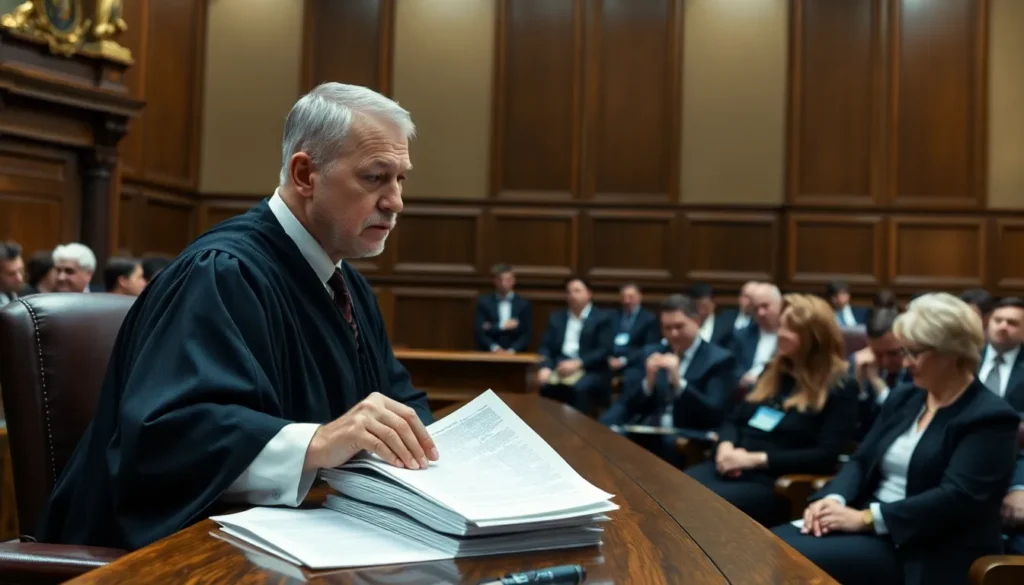In the ever-evolving world of cryptocurrency, legal battles often shape the landscape. The recent ruling in the Doge USIP TRO lawsuit has captured significant attention, highlighting the complexities surrounding digital assets and their regulation. As crypto enthusiasts and investors closely monitor these developments, the implications of this case could set important precedents for future disputes.
This ruling not only affects the parties involved but also sends ripples through the broader crypto community. With the potential to influence how courts interpret digital currencies, it raises questions about ownership, rights, and responsibilities in the rapidly changing financial ecosystem. Understanding the nuances of this case is crucial for anyone navigating the intricate world of cryptocurrency.
Table of Contents
ToggleOverview of Doge Usip Tro Lawsuit Ruling
The Doge USIP TRO lawsuit ruling represents a pivotal moment in cryptocurrency jurisprudence. The court’s decision provides clarity regarding the classification of digital assets within regulatory frameworks. It establishes that factors like intent, usage, and ownership play crucial roles in defining legal standing.
The ruling particularly emphasizes the rights of parties involved in cryptocurrency transactions. Legal protections now appear more robust for users, potentially fostering increased trust in digital assets. This shift may inspire future investors to engage in the market, knowing that legal frameworks are evolving to accommodate their interests.
Judges tackled significant issues around asset ownership, highlighting that the interpretation of digital currencies will likely influence future regulations. The implications extend beyond the immediate case, prompting other jurisdictions to reevaluate their cryptocurrency policies. Stakeholders in the crypto community are encouraged to evaluate this ruling closely, as its effects resonate throughout the industry.
The ruling affirms that courts can adjudicate digital asset disputes, setting important precedents for ownership and responsibility. This judicial insight serves as a guide for future regulatory approaches.
Key Details of the Ruling

The Doge USIP TRO lawsuit ruling offers critical insights into the ongoing evolution of cryptocurrency regulation and ownership. This judgment clarifies various legal aspects fundamental to the cryptocurrency landscape.
Background of the Case
The lawsuit arose from disputes over the ownership and usage of Dogecoin, a prominent cryptocurrency. Placing emphasis on rights between parties involved, the case examined incidents that sparked controversy around digital asset management. Initial actions included claims of unauthorized transactions, prompting legal intervention to establish clarity regarding asset ownership and responsibilities of parties within the digital economy.
Important Legal Points
- Asset Classification: The ruling clarified the classification of cryptocurrencies, determining they fit within existing financial regulatory frameworks.
- Intent and Usage: The court highlighted the significance of intent and usage in establishing legal standings. Factors considered included how the asset is used and the intentions behind its creation.
- Rights of Participants: The ruling reinforced the rights of all participants in cryptocurrency transactions. The judgment suggests that legal protections for investors and users are increasingly recognized.
- Future Implications: Courts can adjudicate digital asset disputes, indicating a shift toward more defined legal standards in the cryptocurrency sector. This decision encourages other jurisdictions to reassess their policies.
This ruling represents a transformative development, paving the way for enhanced legal recognition and stability in the cryptocurrency market.
Implications of the Ruling
The Doge USIP TRO lawsuit ruling carries significant implications for the cryptocurrency landscape and beyond. Its effects extend to the Dogecoin community and the broader financial markets.
Impact on Dogecoin Community
The ruling directly impacts the Dogecoin community by clarifying ownership rights within cryptocurrency transactions. Stakeholders now enjoy clearer legal protections, fostering a sense of security that may encourage greater participation and investment in Dogecoin. The decision reinforces community trust in cryptocurrency as a viable asset class, potentially boosting its adoption. Furthermore, it may inspire developers and businesses to innovate within the Dogecoin ecosystem, knowing that legal parameters for ownership and rights are becoming more defined.
Broader Financial Market Effects
The broader financial markets may experience a ripple effect from this ruling, prompting other sectors to reevaluate their regulatory frameworks concerning digital assets. The clarity surrounding cryptocurrency ownership and usage could lead traditional financial institutions to adapt their strategies, integrating digital currencies into their operations with greater confidence. Additionally, this ruling may influence legislative efforts at both state and federal levels, encouraging lawmakers to establish comprehensive regulatory environments for cryptocurrencies. This development enhances the legitimacy of digital assets in the financial ecosystem, attracting new investors and increasing market stability.
Reactions and Responses
The Doge USIP TRO lawsuit ruling sparked widespread reactions across the cryptocurrency community and among legal experts. Responses indicate a mix of optimism and caution regarding its implications for digital asset regulation.
Community Reactions
Community responses to the ruling highlight a renewed sense of optimism among Dogecoin enthusiasts. Many users expressed relief over clarified ownership rights, viewing the decision as a positive step toward legitimizing cryptocurrencies. Online forums and social media platforms reflect an increasing confidence in Dogecoin’s legal standing. Users believe this ruling could lead to enhanced regulatory clarity and foster greater investment in Dogecoin. Some members emphasize the necessity of continued vigilance, advocating for proactive engagement with legal developments to safeguard their interests.
Expert Opinions
Experts in cryptocurrency law and finance recognize the ruling as a landmark decision that may reshape regulatory landscapes. Legal analysts note that the emphasis on intent, usage, and ownership could create a framework for adjudicating future disputes. Analysts predict that this ruling will influence legislative approaches toward digital assets, pushing for clearer guidelines across jurisdictions. Financial experts highlight the possibility of increased institutional investment in cryptocurrencies as clarity improves, enabling traditional firms to navigate the digital asset landscape with confidence. Overall, professional commentary stresses the ruling’s potential to foster innovation while establishing a safer environment for users and investors alike.
The Doge USIP TRO lawsuit ruling marks a transformative moment for the cryptocurrency landscape. By clarifying ownership rights and legal protections for digital assets, it paves the way for enhanced trust within the community. Stakeholders can now approach investments in Dogecoin with renewed confidence, knowing that their rights are better safeguarded.
This decision not only impacts Dogecoin but also sets a precedent for how digital currencies will be treated in the future. As regulatory frameworks evolve, traditional financial institutions may find new opportunities for integration. The ripple effects of this ruling could inspire innovation and stability across the broader financial ecosystem, making it a key development for anyone involved in cryptocurrency.



